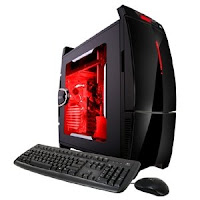 I wanted to get rid of the my bulky monitor and replace it with a LCD monitor. But like most of us, it was just not in the budget. I did have a laptop and it was connected to my home network. I had to set up a home network to share my internet connection with my son.
I wanted to get rid of the my bulky monitor and replace it with a LCD monitor. But like most of us, it was just not in the budget. I did have a laptop and it was connected to my home network. I had to set up a home network to share my internet connection with my son.So I thought, it would it be great if I could use the laptop to run my tower. That is when I discovered what the Remote Desktop Connection can be used for. This program is included in the Windows XP Professional version. To start with, the Host Computer (the pc tower with XP Pro) should be running and connected to a router or hub.
To set up Remote Desktop Connection
(RDC) on the host:
Start > Control Panel > System Select the Remote Tab.
Check the box to Allow users to connect remotely to this computer. Note the Full computer name, this will be needed for the laptop to find the host computer.
You will also need to set up an user account with password for the remote connection to work. This may be already set up for you, if you have to enter a password to login to your desktop computer. Then the Client (the laptop with XP Pro) should be running and connected to a router or hub. If your laptop is not XP Pro, you will have to download the client portion of Remote Desktop. This program allows other versions of Windows to remotely connect to a computer running Windows XP Professional with Remote Desktop enabled. On the laptop, start the RDC client program, enter the host computer name in the drop box marked computer. Then enter your username and password, the one you use to login to the host computer normally.
Press the connect button and watch what happens next. Your laptop will act like it is connected directly to your pc tower. You will see the entire desktop screen, just as if you were looking at the monitor connected to the computer. This is great for older laptops with a small hard drive and slow processor. The host computer does all the hard work and can even store the files created during the remote connection. Have fun and enjoy this practical laptop trick!!
Visit http://www.buildtheperfectpc.com for more Laptop fun ideas.
Article Source: http://EzineArticles.com/?expert=Janean_Wilson


No comments:
Post a Comment